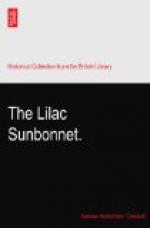“Then when shall I see you?” said Winsome piteously. It is the cry of all loving womanhood, whose love goes out to the battle or into the city, to the business of war, or pleasure, or even of money-getting. “Then when shall I see you. again?” said Winsome, saying a new thing. There is nothing new under the sun, yet to lovers like Winsome and Ralph all things are new.
There was a catch in her throat. A salter dew gathered about her eyes, and the pupils expanded till the black seemed to shut out the blue.
Very tenderly Ralph looked down, and said, “Winsome, my dear, very soon I shall come again with more to ask and more to tell.”
“But you are not going straight away to Edinburgh now? You must get a drive to Dumfries and take the Edinburgh coach.”
“I cannot do that,” said Ralph; “I must walk all the way; it is nothing.”
Winsome looked at Ralph, the motherly instinct that is in all true love surging up even above the lover’s instinct. It made her clasp and unclasp her hands in distress, to think of him going away alone over the waste moors, from the place where they had been so happy.
“And he will leave me behind!” she said, with a sudden fear of the loneliness which would surely come when the bright universe was emptied of Ralph.
“Had it only been to-morrow, I could have borne it better,” she said. “Oh, it is too soon! How could he let us be so happy when he was going away from me?”
Winsome knew even better than Ralph that he must go, but the most accurate knowledge of necessity does not prevent the resentful feeling in a woman’s heart when one she loves goes before his time.
But the latent motherhood in this girl rose up. If he were truly hers, he was hers to take care of. Therefore she asked the question which every mother asks, and no sweetheart who is nothing but a sweetheart has ever yet asked:
“Have you enough money?”
Ralph blushed and looked most unhappy, for the first time since the sun rose.
“I have none at all,” he said; “my father only gave me the money for my journey to the Dullarg, and Mr. Welsh was to provide me what was necessary—” He stopped here, it seemed such a hard and shameful thing to say. “I have never had anything to do with money,” he said, hanging down his head.
Now Winsome, who was exceedingly practical in this matter, went forward to him quickly and put an arm upon his shoulder.
“My poor boy!” she said, with the tenderest and sweetest expression on her face. And again Ralph Peden perceived that there are things more precious than much money.
“Now bend your head and let me whisper.” It was already bent, but it was in his ear that Winsome wished to speak.
“No, no, indeed I cannot, Winsome, my love; I could not, indeed, and in truth I do not need it.”
Winsome dropped her arms and stepped back tragically. She put one hand over the other upon her breast, and turned half way from him.




